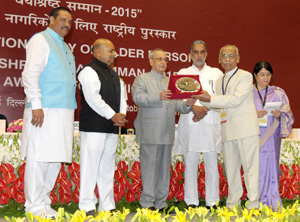
NEW DELHI, Oct 1: Citing increase in life expectancy, President Pranab Mukherjee today emphasised on providing affordable and accessible medical care for the elderly.
Addressing a function, he said there is a need to sensitise various strata of society, especially younger generation, to challenges of social isolation, neglect, care and emotional support being faced by elderly people.
Mukherjee said both the voluntary and corporate sectors must also be encouraged to set up institutional care centres to make available comprehensive care, including geriatric healthcare facilities, to the inmates.
The elderly face a plethora of physical problems, including reduced physical strength, decreased immunity, aggravation of ailments already present, onset of sensory and motor disabilities, weakened memory and a slide in intellectual prowess, he said.
“Combination of adverse health conditions such as these can have serious implications for the physical, emotional and economic well-being of our senior citizens. If an elderly person is unable to secure specialised medical care due to lack of affordability or accessibility, it will compound the hardships already being faced by him or her.
“It is important that institutions to provide geriatric care be established, strengthened and made more affordable for the common man,” the President said during a function organised by the Ministry of Social Justice and Empowerment to honour senior citizens.
Citing the Indian tradition of respecting and caring for elders and terming elderly the most valuable part of the family, he said that society “must not let this socio-cultural asset of ours wither away”.
“The societal transformation from joint to nuclear families notwithstanding, we must encourage in the younger lot the ability and keenness to facilitate ageing in their own homes. To realise this, the availability of geriatric care givers at affordable cost must be ensured,” Mukherjee said.
October 1 is observed as the International Day of Older Persons.
The President said young people must be sensitised to acquire necessary skill and training as that would ensure that the ability of nuclear families to take proper care of senior citizens is not impeded by shortage of trained geriatric care givers.
Mukherjee said facilities to provide institutional care to needy elderly persons must be established in sufficient numbers.
“States and local bodies must take the lead in ensuring that adequate mechanism to provide institutional care to the aged is available within the reach of the needy,” he said.
The President said that life expectancy has gradually risen over the years in the country.
From 59 years in 1990, life expectancy at birth has increased to 66 years in 2013. World over, the population of the aged is increasing. India is no exception, Mukherjee said.
“The phenomenon of age dependency will strengthen in the years to come. This will give rise to a host of issues which need to be dealt in a more comprehensive manner and with a greater sense of urgency. Older persons cannot wait indefinitely as time is also running out for them,” he said.
Mukherjee also suggested changes by the Centre and at the state level in the legal framework to ensure safety and security of the elderly.
“If found necessary, the legal provisions have to be re-visited and requisite modifications carried out. A robust legal framework implemented with vigour would help ensure the safety, security and well-being of elderly persons in our country,” he said.
Mukherjee also honoured 11 people in seven categories with the ‘National Awards for Senior Citizens-2015’ for their contribution in helping the elderly in various ways. The function was attended by Social Justice and Empowerment Minister Thaawar Chand Gehlota. (PTI)

